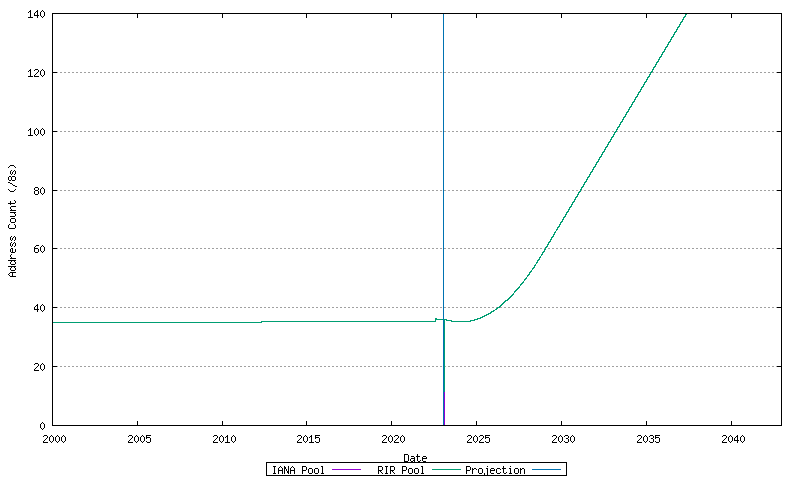19 June 2007
Press Release
Japan Network Information Center
About IPv4 address exhaustion in Internet Registries*1Japanese Page
On 19 June 2007, JPNIC issued a press release regarding the IPv4 address consumption. This is an English translation of the original official statement in Japanese. The traslation is provided with the assistance from APNIC.
In the last 10 years, the dramatic development of the Internet industry has led to the depletion of the remaining free pool of IPv4 addresses available to the Regional Internet Registries (RIRs). The IPv4 address pool is expected to run out around 2010, according to the most reliable predictions*2.
This does not mean we will not be able to use the existing IPv4 Internet after the address pool runs out and there are no more unallocated IPv4 addresses available from the Regional Internet Registries.
However, when we think about Internet development and expansion from mid-and long-term perspectives,, IPv4 address exhaustion will create a great restriction on the Internet, and will inevitably raise serious issues as time progresses.
To overcome IPv4 address exhaustion and continue the expansion and development of the Internet, the fundamental solution is to move forward to an Internet based on IPv6*3. To maintain the existing IPv4 based Internet, and to create smooth transition to IPv6, it is also important to recover and recycle unused IPv4 addresses.
The Internet has become an essential infrastructure for commercial activities and and everyday life. To overcome IPv4 address exhaustion and continue the smooth operation of the Internet, all relevant people around the Internet have to cooperate and solve this issue.
JPNIC is proactively working to solve this IPv4 exhaustion issue. Firstly, we will try the two ways described below:
- As the National Internet Registry of Japan, develop Internet Protocol (IP) address management policies that adequately prepare for IPv4 address exhaustion which reflects voices from various stakeholders within Japan, as well as undertaking international coordination in the Internet policy area.
- As a public corporate body that participates in maintaining the smooth operation of the Internet, we aim to promote discussions on measures for the use of IPv6, its implementations, as well as to provide accurate information on the issue of IPv4 address exhaustion, through cooperation with relevant persons and organisations nationally and internationally.
*1 An organisation in charge of IP address management is called an "Internet Registry", and operates under a hierarchical structure with the Internet Assigned Numbers Authority (IANA) at the top. Under IANA, there are Regional Internet Registries (RIRs) in charge of managing IP addresses regionally. Below RIRs, there are Local Internet Registries (LIRs). IP addresses are distributed through this hierarchical structure from IANA to RIR, RIR to LIR, then LIR to the network.
In some regions, there are National Internet Registries (NIRs). JPNIC, the Japanese NIR manages IP addresses in Japan.

*2 Prediction of exhaustion date by Geoff Huston
 The red line indicates the number of /8 address blocks remaining
in the IANA free pool. The green line indicates the number of
/8 address blocks available in RIR free address pools. The
vertical line indicates today.
The red line indicates the number of /8 address blocks remaining
in the IANA free pool. The green line indicates the number of
/8 address blocks available in RIR free address pools. The
vertical line indicates today.
*3 IPv6 is a new version of the Internet Protocol (IP), developed to create a larger address pool with some additional improvements to IPv4. It has been more than ten years since IPv6 was developed, and it is already widely implemented.




